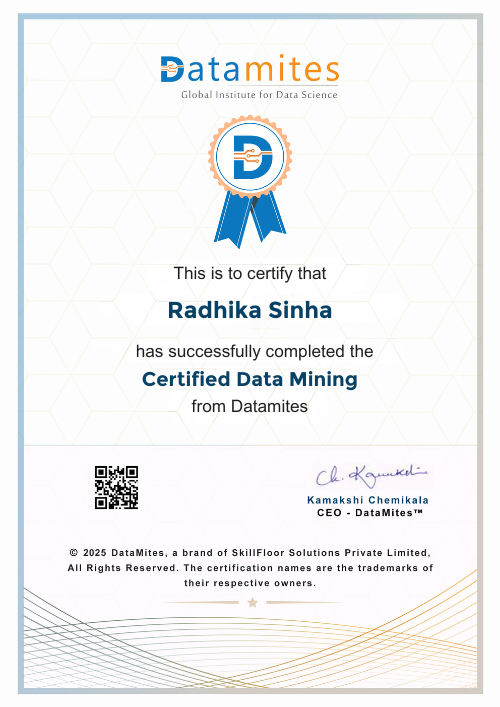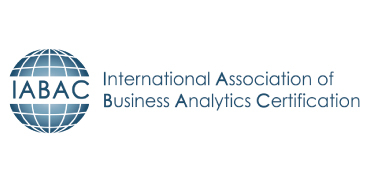Instructor Led Live Online
Self Learning + Live Mentoring
In - Person Classroom Training




Introduction to R:
Data Manipulation with R:
Data Visualization with R:
The following topics are covered in "Machine Leaning"
Foundation:
Machine Learning Introduction: Supervised and Unsupervised Learning
Multiple Linear Regression
Decision Tree:
Naive Bayes:
Support Vector Machines:
Association Rule:
Expert:
Neural Net:
Random Forest:
Recommendation Engine:
Dimension Reduction:
The topic covered in "Text Mining" are
Text Mining:
Advanced Regression
Web Analytics:
Data mining involves the exploration and analysis of extensive raw data to uncover patterns and extract valuable insights. Businesses leverage data mining software to gain deeper insights into their customer base, aiding in the development of more efficient marketing strategies, boosting sales, and reducing costs.
Data mining involves uncovering anomalies, patterns, and correlations within extensive datasets to anticipate outcomes. Employing a diverse array of techniques, this information can be harnessed to enhance revenues, reduce costs, cultivate customer relationships, mitigate risks, and achieve various other benefits
STATISTICA Data Miner organizes the modeling screen into four primary stages of data mining: (1) acquiring data; (2) cleaning, preparing, and transforming data; (3) analyzing, modeling, classifying, and forecasting data; and (4) generating reports.
To be eligible for admission to the Postgraduate Program in Data Mining, candidates must possess a bachelor's degree from a recognized university in science, computer engineering, or a BTech degree.
Data mining specialists represent a specific expertise within the expansive realm of data science careers, which is currently one of the fastest-growing fields worldwide. According to the U.S. Bureau of Labor Statistics, there is a projected 36% growth in data science occupations anticipated through the year 2031.
Understanding data mining is commonly seen as a complex endeavor. Nevertheless, acquiring proficiency in this crucial field of data science is more manageable than it may initially seem.
Data specialists need statistical knowledge and some programming language knowledge to complete data mining techniques accurately. For instance, here are some examples of how companies have used R to answer their data questions.
Consequently, SQL Server is currently employed for conducting Data Mining tasks as it incorporates data necessary for making predictions. Nowadays, rather than relying on programming languages such as Python and R, you can utilize SQL for the collection, filtering, and analysis of data, fostering business growth.
In essence, the practice of data mining necessitates the amalgamation of methodologies from various fields, encompassing statistics, mathematics, machine learning, database technology, data visualization, pattern recognition, signal processing, information retrieval, and high-performance computing.
The collaboration between data mining and AI is pivotal in driving positive impacts on your data-related initiatives, consequently benefiting your organization as a whole.
Tools for data mining encompass robust statistical, mathematical, and analytic functionalities designed to sift through extensive datasets, aiming to discern trends, patterns, and relationships. Their core objective is to facilitate informed decision-making and strategic planning.
Python stands out as an exceptional option for data mining owing to its qualities as a general-purpose, high-level, and dynamic programming language that accommodates various paradigms, including object-oriented, functional, and procedural programming.
The salary of a data mining in India ranges from INR 44,324 per year according to a Glassdoor report.
Essentially, machine learning (ML), artificial intelligence (AI), statistical analysis, and data management represent essential components of data mining, vital for the examination, categorization, and preparation of data for analysis.
Gregory Piatetsky-Shapiro introduced the term "knowledge discovery in databases" during the inaugural workshop on the subject (KDD-1989), gaining traction in AI and machine learning circles. Nevertheless, the term "data mining" gained more prominence within business and press communities.
DataMites is a reputable training institute specializing in comprehensive Data Mining courses in India, providing industry-relevant training and practical exposure for individuals to develop skills in data analysis, mining, and extraction.
Instructors at DataMites are highly experienced professionals with expertise in Data Mining and related fields, possessing extensive industry knowledge and adept teaching methodologies for high-quality training.
Basic knowledge of statistics, a fundamental understanding of programming concepts, and familiarity with databases and data handling are recommended prerequisites for enrolling in Data Mining courses in India at DataMites.
DataMites' Data Mining course in India is meticulously structured to provide a step-by-step learning experience, covering theoretical concepts and practical applications of Data Mining techniques for a holistic understanding of the subject.
The Data Mining course curriculum at DataMites encompasses various topics, including data preprocessing, exploration, association rule mining, classification, clustering, regression, text mining, and may include advanced concepts such as ensemble learning and deep learning.
Certainly, DataMites places a strong emphasis on hands-on learning by integrating practical exercises and projects into their Data Mining course. These activities allow participants to apply their knowledge in real-world scenarios.
DataMites leverages industry-standard tools and software, including R, Python, Weka, RapidMiner, and SQL, to equip participants with proficiency in data analysis, modeling, and visualization.
Through practical assignments, projects, and case studies mirroring real-world scenarios, DataMites supports students in effectively applying Data Mining techniques. Instructors offer guidance throughout the course, ensuring practical skill application.
The Data Mining course at DataMites spans 3 months, including 5 capstone projects and 1 client project.
Absolutely, DataMites awards data mining certifications in India upon successful completion the course, validating participants' expertise and enhancing their career prospects.
Certainly, DataMites offers career support and job placement assistance post-course completion. This includes resume building, interview preparation, and facilitating connections with job opportunities in relevant industries.
Yes, DataMites provides classroom learning options for the Data Mining course in India. Students can opt for self-paced learning or participate in instructor-led online classes, offering flexibility to accommodate individual schedules.
DataMites ensures accessibility by offering an affordable course fee for the Data Mining course in India. The live virtual training starts at Rs 34,000, while the blended learning option begins at Rs 20,000. Classroom training is available from Rs 42,000.
DataMites accepts various modes of payment, including Net Banking, Check, Cash, Debit Card, Credit Card, PayPal, Visa, Mastercard, and American Express.
Opting for DataMites for a Data Mining course is a prudent choice due to its comprehensive curriculum, experienced trainers, and practical approach. This equips students with the knowledge and skills required to excel in the field, enhancing their career prospects in the data mining industry.
The DataMites Placement Assistance Team(PAT) facilitates the aspirants in taking all the necessary steps in starting their career in Data Science. Some of the services provided by PAT are: -
The DataMites Placement Assistance Team(PAT) conducts sessions on career mentoring for the aspirants with a view of helping them realize the purpose they have to serve when they step into the corporate world. The students are guided by industry experts about the various possibilities in the Data Science career, this will help the aspirants to draw a clear picture of the career options available. Also, they will be made knowledgeable about the various obstacles they are likely to face as a fresher in the field, and how they can tackle.
No, PAT does not promise a job, but it helps the aspirants to build the required potential needed in landing a career. The aspirants can capitalize on the acquired skills, in the long run, to a successful career in Data Science.



